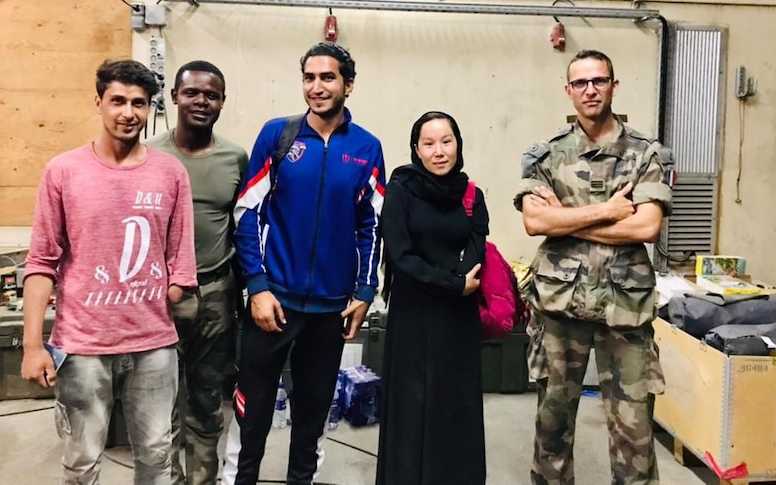Taliban Tuesday. That’s how August 17, 2021, should be remembered.
They had moved into Afghanistan’s capital, Kabul, and taken control of the country on Monday, but it was on Tuesday that female athletes, both inside and outside the country, realised the danger they were in.
Young, vocal, strident women, trailblazers in Afghanistan and celebrated internationally, believed they were now the hunted.
In the Muslim world it is common to hear the call to prayer from one mosque, half a beat later from another down the road, then another on the other side of town, then coming from all around, a city-wide chorus.
This time the call wasn’t to prayer, it was a prayer. It wasn’t to the locals, it was to the globe, to anyone who could hear, to anyone who could help.
The women athletes of Afghanistan had no idea it would be a small group Australians, led by former athletes, who would not only hear their call but would carry off a painstaking, difficult, absorbing rescue mission that spanned multiple countries and went to the highest levels of power in sport, intelligence, and politics.
‘Women in Afghanistan don’t have an identity’

The first captain of the Afghanistan football team, Khalida Popal, had lived under the Taliban before. She knew what the current players were in for and her calls sparked international attention to focus not just on the political shift in a country ravaged by war but to ask, what about the women of Afghanistan?
“I feel so much pain, I feel devastated, that I cannot help … I see women stuck there, I hear their voices, the shaky voices of women being scared and afraid … I feel helpless, it’s just non-stop,” she told The Ticket from Denmark.
The former coach of the team, American Kelly Lindsay, voiced a different concern, one that sparked action in Australia.
“The people of the world need to come together and just get them to safety. It can’t be about, do you have the right paperwork, do you have the right identity card, do you have the right passport?
“Because I’m going to tell you so many women in Afghanistan don’t have an identity, don’t have an identity card, don’t have a passport.”
The London-based chef de mission of Afghanistan’s Paralympic team, Arian Sadiqi, did not know where to turn to help his two athletes only days away from competing, but now stranded and at risk in a country still wrestling with the place of the disabled.
He feared most for the first woman ever selected, Zakia Khudadadi, and encouraged her to send a video describing her plight that he could distribute to the world’s media.
“I have been imprisoned inside the house … I cannot go outside the house without confidence or security… please help,” she said.
By Wednesday morning, Olympian Nikki Dryden, now a human rights lawyer and founder of Lex Athleta, had teamed up with the director of Human Rights for All, Alison Battisson, whose speciality was helping refugees detained in Australia.
Their determination and attention to detail saw them compile a list of the most at-risk athletes and their dependants — totalling more than 50 — by connecting on social media and any means possible with athletes such as Popal.
They worked with the Swiss-based Centre for Sport and Human Rights (CSHR) to call on all governments to offer what help they could. Through the night Dryden stayed in touch with the athletes, updating details while Battisson completed visa applications one after the other.
It quickly became clear that getting authorisation application by application would be too slow. They needed a political solution.
Football’s world player association, FIFPRO, based in Europe, was calling on its government contacts, too, asking who could offer what assistance? Who could take some of the athletes? Who could help avert a tragedy that was certainly awaiting their fellow athletes?

Dryden had worked previously with former Socceroo captain, Craig Foster, who spearheaded an international campaign in 2018-2019 to save former Bahraini footballer, Hakeem al-Araibi, from wrongful detention and almost certain death.
They reconnected and Foster set about putting together a political strategy.
His immediate access to the highest levels of Australian government, especially the Foreign Minister, Marise Payne, who had been key in saving al-Araibi’s life.
Foster is on the board of the Australian Multicultural Council under the banner of the immigration portfolio. He called on Immigration Minister Alex Hawke to get involved too.
Foster brought in two more national sporting heroes: Paralympic wheelchair racer Kurt Fearnley, who reached out to the Sports Minister Richard Colbeck and got Paralympics Australia on board, and Winter Olympian-now member of the Federal Parliament Zali Steggall, who is a barrister who could win any argument, a proven campaigner for women’s rights, and understands the nexus where sport and politics collide.
Dryden was coordinating it all, working the phones and emails.
Meantime, Battisson was crossing t’s and dotting i’s in the mountain of paperwork required for the visa applications. All of them needed the signatures of sponsors. The athletes’ network stepped up again. Signatures came from other Olympians, Paralympians and sportspeople — many of them women.
Incredibly, in the space of three days the Australian government had agreed to accept the athletes as Foster, Steggall and Fearnley leaned on the government to take them as a matter of urgency.
The government, recognising its stated commitment to the twin legacies of women’s sport and human rights in backing events such as the 2023 FIFA Women’s World Cup, knew their claims would look hollow if they could not offer support to female athletes in a time of crisis — no matter where they were from.
By the weekend the mission had moved from planning to the operation phase. Athletes had to get to the airport and somehow make contact with Australian Defence Force personnel.
It was a little like asking 50 needles to find their own way out of an enormous haystack.
The team of former Aussie athletes lacked just one thing — on the ground security knowledge and military understanding to cut through the mayhem for pinpoint accuracy around Kabul’s Hamid Karzai International Airport.
Negotiating airport chaos

Allied troops were already dealing with a growing humanitarian crisis. Locals had coalesced in their thousands on the airport hoping for a way out. Three layers of perimeter fencing were under strain as crowds of desperate people — some with documentation, most not — gathered and pushed at every access point.
There were Taliban checkpoints to navigate before getting to the airport precinct.
Reports people without a foreign passport or a marked car — embassy staff, Red Crescent, or one of the agencies — were being turned back.
And yet thousands were somehow getting through.
Once there, guarantees could not be given that the athletes would be able to push their way through the crush to find an Australian Defence Force official, or any other official who might pass the message on, in order to gain access through the series of gates and into the safety of the terminal.
There were other reports, too. Seven people or more had been crushed in the airport crowd. Without food and water, under the desert sun, had a growing number of adults and children in distress. Troops were doing what they could. At one point a single rubber hose was used to spray water over the crowd to offer what little assistance they could.
Dryden was introduced to one of the world’s leading security experts, with deep knowledge of the Middle East, excellent defence contacts worldwide, and importantly someone the Australian government trusted — the CEO of Intelligent Risks, Neil Fergus.
At one point on Sunday, the Paralympians had become separated from the rest of the group and were in danger of missing the very small window they had to get through the security gates and into the terminal.

Fergus took control of negotiations with the help of his contacts on the ground across several nationalities.
But the athletes and their dependants were turned back not once, but twice. Stress levels were building. They needed direct access or an intervention to make it work.
Foster contacted the government. It intervened and got the message to the gate: Let them in!
Below is some of the detail recorded in WhatsApp messages between the key players as the rescue mission entered its final stages at Kabul airport late on Sunday night. They have been paraphrased for security reasons.
2334hrs
Good news … expect more…
2336hrs
About half are through … pressure is on to find the Paralympians.
2353hrs
Safe movement still not assured.
Monday, August 23, 2021
0009hrs
Almost all through. Paralympians separated from the group. Searching, Urgent communications required.
0010hrs
At a different gate.
0010hrs
[BLANK OUT NAME] — where are they — urgent location update please.
0015hrs
Found them. Phone lines keep dropping out. Need a patrol vehicle to volunteer to collect them.
0014hrs
Photos sent with location. Athlete close to exhaustion.

0016hrs
Location identified. Risk is escalated.
0045hrs
They are not close enough. They must advance — any way they can. Defence personnel cannot exit perimeter to escort.
0046hrs
Tell them to do whatever is necessary to get to the gate. Time is running out.
0048hrs
OK (thumbs up emoji). I am on it.
0050hrs
We need to keep lines of communications clear now so defence personnel can make contact.
0051hrs
British are the gate, athletes names not on their list, difficulty entering.
0052hrs
We are making contact.
0052hrs
Great.
0109hrs
Waiting for thumbs up.
0118hrs
Through the first security gate.
0119hrs
Getting closer.
0122hrs
Brits have waived them through. They are inside security system.
0124hrs
Non-rejection by Brits at gate is a good sign. Our people now moving to locate them.
0126hrs
Thumbs up all round
0127hrs
About a dozen girls still outside. Plus group from karate.
Through the night and into the morning the Sydney group continued their mission, sending WhatsApp messages back and forth with each other, including a young ADF corporal who was their first contact on the inside.
Battisson triaged athletes and dependants directly to him and the contacts on the ground who were helping the women flee.

By Monday morning, as Australians awoke, they had no idea that a small group among them, with the incredible fast-moving support of the government, had saved the lives of more than 50 Afghan athletes and dependants.
The final two messages came from Foster:
0359 hrs – Foster
They are safe. In Australian hands.
0410 – Foster
This is what Australia should be every day.
Credit: AIPS via ABC News


